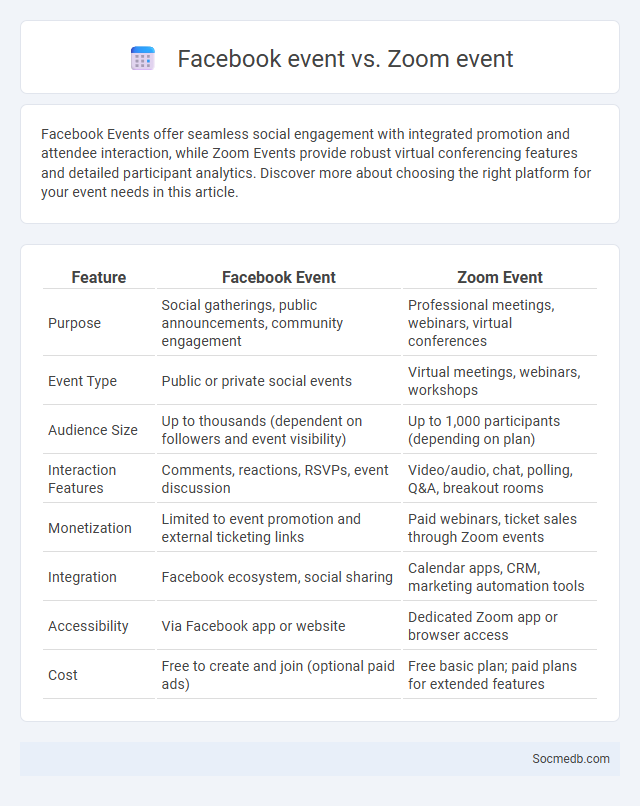
Photo illustration: Facebook Event vs Zoom Event
Facebook Events offer seamless social engagement with integrated promotion and attendee interaction, while Zoom Events provide robust virtual conferencing features and detailed participant analytics. Discover more about choosing the right platform for your event needs in this article.
Table of Comparison
| Feature | Facebook Event | Zoom Event |
|---|---|---|
| Purpose | Social gatherings, public announcements, community engagement | Professional meetings, webinars, virtual conferences |
| Event Type | Public or private social events | Virtual meetings, webinars, workshops |
| Audience Size | Up to thousands (dependent on followers and event visibility) | Up to 1,000 participants (depending on plan) |
| Interaction Features | Comments, reactions, RSVPs, event discussion | Video/audio, chat, polling, Q&A, breakout rooms |
| Monetization | Limited to event promotion and external ticketing links | Paid webinars, ticket sales through Zoom events |
| Integration | Facebook ecosystem, social sharing | Calendar apps, CRM, marketing automation tools |
| Accessibility | Via Facebook app or website | Dedicated Zoom app or browser access |
| Cost | Free to create and join (optional paid ads) | Free basic plan; paid plans for extended features |
Introduction to Event Platforms
Event platforms revolutionize social media by providing interactive spaces that enhance user engagement through live streaming, real-time chats, and virtual networking. These platforms integrate seamlessly with social media channels to amplify event reach and foster community building. Your online presence benefits from leveraging event platforms to create immersive experiences that drive participation and brand loyalty.
Overview of Facebook Events
Facebook Events enable users to create, share, and manage event invitations seamlessly within the social media platform, fostering community engagement and real-time interaction. The feature supports detailed event pages with options for RSVPs, time, location, and updates, enhancing attendee communication and organization. With over 2 billion active users, Facebook Events serve as a powerful tool for personal, business, and public event promotion and coordination.
Overview of Zoom Events
Zoom Events is a comprehensive social media platform designed to facilitate virtual gatherings, conferences, and interactive webinars. It integrates seamless video conferencing with robust engagement tools, enabling You to create immersive experiences for attendees worldwide. With features like event registration, multi-session support, and real-time analytics, Zoom Events optimizes your ability to connect and collaborate within professional and social communities.
Traditional In-Person Events Explained
Traditional in-person events provide a unique opportunity for direct social interaction, fostering stronger relationships and meaningful connections. Your experience at these events engages multiple senses, enhancing communication through body language and immediate feedback. Unlike social media platforms, in-person gatherings eliminate digital distractions, creating a focused environment for networking and collaboration.
Key Features Comparison
Social media platforms offer varying key features that cater to different user needs, such as Instagram's visual-centric approach with Stories and Reels, Facebook's extensive networking and group options, and Twitter's real-time news updates and concise communication format. You can leverage LinkedIn's professional networking tools and content sharing capabilities to enhance career opportunities, while TikTok excels in short-form video content with powerful algorithm-driven personalization. Understanding these core functionalities allows you to select the social media platform that best aligns with your engagement goals and audience preferences.
Audience Reach and Engagement
Maximizing audience reach on social media relies on targeted content strategies and leveraging platform-specific algorithms to connect with diverse demographics. High engagement rates are achieved through interactive posts, timely responses to user comments, and consistent use of multimedia elements like videos and stories. Analytics tools provide critical insights into audience behavior, enabling continuous optimization of content for greater visibility and interaction.
Event Promotion Strategies
Effective event promotion strategies on social media leverage targeted advertising, influencer partnerships, and engaging content to maximize reach and attendance. Utilizing platform-specific features like Facebook Events, Instagram Stories, and LinkedIn Event pages enhances visibility and user interaction. Analyzing engagement metrics and audience demographics allows for continuous optimization of promotional campaigns, ensuring higher conversion rates and event success.
User Experience and Interactivity
Social media platforms prioritize user experience by implementing intuitive interfaces and personalized content algorithms that enhance engagement. Interactive features such as live videos, polls, and real-time messaging foster active user participation and community building. Continuous optimization of load times and seamless navigation further improve usability, increasing user retention and satisfaction.
Cost and Accessibility Analysis
Social media platforms offer cost-effective marketing solutions by providing free account creation and low-cost advertising options accessible to businesses of all sizes. With mobile and internet penetration increasing globally, your ability to reach diverse audiences is enhanced significantly, reducing barriers traditionally associated with market entry. Cost and accessibility factors make social media an essential channel for maximizing brand visibility and engagement with minimal financial investment.
Choosing the Right Platform for Your Event
Selecting the right social media platform for your event depends on your target audience and event type, with Instagram and TikTok excelling for visually-driven, younger demographics, while LinkedIn suits professional conferences and networking events. Facebook's extensive event features and groups provide versatile tools for community engagement and RSVP tracking, making it ideal for local and diverse audiences. Twitter facilitates real-time updates and trending topic engagement, crucial for dynamic events like product launches and live streams.
 socmedb.com
socmedb.com